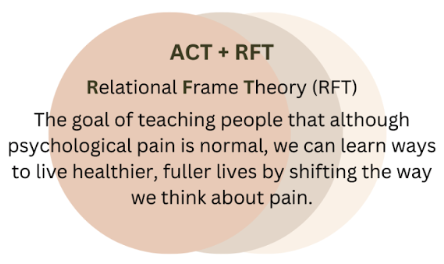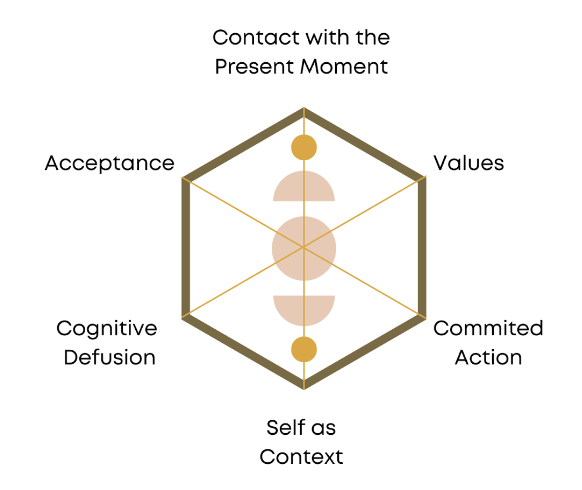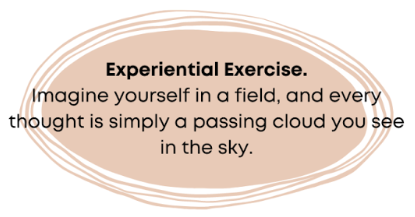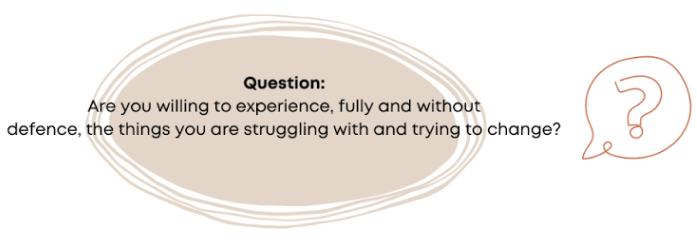A Guide to Acceptance & Commitment Therapy (ACT)
What is Acceptance and Commitment Therapy?
It is one of the many modalities of Cognitive Behavioural Therapy (CBT). ACT focuses explicitly on acceptance, mindfulness, cognitive defusion, values and committed action.
Being a form of psychotherapy, ACT’s perceptive is that psychological suffering happens due to ongoing avoidance, leading to rigidity. This can ultimately prevent you from behaving according to your values. ACT is based on RFT, this is an area focusing on cognition and human language. Sometimes we need to use alternative skills to overcome our psychological pain.
The goal of ACT, and therapy, is to help you overcome ineffective behaviour patterns that may prevent you from achieving a better quality of life. There are two core psychological processes ACT thinks are important in terms of causing psychological suffering - cognitive fusion and experiential avoidance.
Components of ACT
ACT is based on a model of 6 processes - the hexaflex. The purpose of the 6 processes is to alleviate any suffering you may be going through, and this is done by optimizing your psychological flexibility. The 6 processes can be broken down into two categories in this therapy - Acceptance and Commitment.
Commitment
Present moment awareness, on a moment-to-moment basis you have a degree of awareness of the psychological and environmental components happening. The purpose of this process is that you can become present and in contact with your world. Through ACT, it allows you to focus on the specifics of a situation, being able to distinguish being in the moment versus being hooked on thoughts in your head.
Values, what are your domains of importance? Values are the guiding principles that help you to motivate your behaviour. It is also important to be aware that your values can alter slightly depending on the situation. For example, you can have the value of ‘being a good employee/friend/wife/husband/etc.’, which looks different depending on the situation. You can be guided by that value but there is not just one way it can take place.
Committed action will help you work on your impulsivity, avoidance and potentially the amount of inaction present in your life. This ties in with your values and how despite experiencing a reaction that may feel uncomfortable, you have committed to pursue valued ends even when faced with discomfort. You have made the decision that you are going to engage in behaviours willingly, persist, and develop that psychological flexibility.
Acceptance
Cognitive Defusion, helps you to understand that your thoughts are only verbal events, not actual events. ACT wants to teach you how to interact with your thoughts, becoming flexible in how you approach and perceive them. For example, understanding that “I am having the thought that…”, having this way of thinking can allow you to behave differently, or even help you face the avoidance you may be experiencing. Cognitive Defusion can be put into practice with a repetition exercise, this is done by repeating a word until you experience it as only auditory, not the meaning it carries.
Self as context is more about a specific awareness of the self and how it is distinct from all your thoughts. As I’m sure you know, the self is something that can be constantly experienced. While the self is constant, it contributes to also noting that thoughts and emotions, experiences are also constant. But with ACT it is important to remember that the self is a medium that all these things are arising and passing through - detaching from the experience means you will be able to become more flexible, in behaviour and psychologically. A way to practice the self as context, try and imagine yourself in a safe space, similar to an experiential exercise.
Acceptance, you are not trying to alter or avoid the unpleasant material, but rather you are trying to work towards the awareness and compassion acceptance of it instead. ACT shifts from a more traditional view of acceptance. For example, CBT may want to work towards emotional regulation, or reducing symptoms. With ACT, it is more about your values and acceptance within the context and structure of the values, not just regulation or reduction.
Who would benefit from ACT?
Based on research, ACT can be useful to those with anxiety, depression, obsessive-compulsive disorder (OCD), post-traumatic stress disorder (PTSD), chronic pain, psychosis, eating disorders, smoking cessation, and substance abuse.
It can also be beneficial for anyone who is struggling with accepting emotions, and situations. Also, those in general who would like to start incorporating therapy.
How do you know if ACT is right for you? What are the benefits?
Do you want to learn to work with your experience? Gain more self-awareness? Live according to your values? If you said ‘yes’ to any of these, it may be something to discuss with your therapist.
An important note is that ACT can help with accepting your emotional distress and help that recognition that it is part of the human experience - does not mean something is wrong with you.
How is this applicable in therapy?
Your therapist will help you learn to apply the processes of ACT in your life. They might help you with acceptance, present moment awareness, or any other combination they see fit. They may also incorporate mindfulness exercises, or help you realize which behaviours or actions are helping you align with your values.






